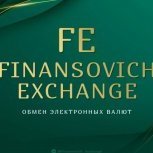-
Topics
-
Сообщения
-
By CoinClick.cc · Posted
Аналитик, известный под псевдонимом Kaleo, сообщил своим 640 000 подписчикам в запрещённой в России соцсети X (ранее Твиттер), что Dogecoin может вырасти до $1 или даже до $2. По словам эксперта, сейчас рынок криптовалют находится в так называемом суперцикле мемкоинов. Kaleo считает, что криптовалюты, вдохновлённые мемами, уже показывали периоды, когда их стоимость возрастала на 6000% от минимумов и даже на 30 000% от исходных значений. По его словам, потенциальный прорыв DOGE может произойти в период с декабря этого года по февраль 2025 года, но не раньше потенциального спада, в результате которого DOGE вернётся к отметке $0,08 или $0,1, поскольку аналогичный прорыв тренда с просадкой в 30% произошёл в 2020 году. Эксперт указал, что технический индикатор Гауссовского канала (GS), который на недельном графике Dogecoin стал зелёным, является ещё одним доказательством того, что, когда придёт время, курс DOGE невероятно вырастет. Напомним, что за последние несколько месяцев сектор мемкоинов демонстрирует максимальную доходность по сравнению с другими виртуальными активам, что ещё больше привлекает к нему внимания инвесторов и трейдеров. Таким образом, у DOGE, как и других мемкоинов есть шансы на то, чтобы и дальше демонстрировать высокую прибыль на рынке. Источникhttps://ru.investing.com/news/cryptocurrency-news/article-2444960📎 ——————————————————— ОБМЕНЯТЬ / ПОМОЩЬ / ОТЗЫВЫ -
dedione.store Прокси socks5, Сервера VPS, Сервера c GPU, Выделенные сервера, RDP | FastFlux | Домены
By dedione_store · Posted
VPS сервера от 6$Выделеные сервера от 54$Сервера с GPU от 300$с полным списком услуг можно ознакомится на нашем сайтеDEDIONE-Available Serversнаши контакты:TG: https://t.me/Alffi_Solomonsподписывайтесь на наш канал переодически добавляем сервера с большими скидками или совершенно бесплатно.ссылка на канал https://t.me/+u1QBackNiKZjYWVk -
Друзья, наши курс на данный момент: USDT – RUB – 82.1 (Не забывайте, что курсы нестабильны, точные данные можете узнать в моменте у поддержки)
-
Добрый день всем нынешним и будущим клиентам 😊 Курс по направлению: BTC – RUB – 5 059 946 Обменник работает в ручном режиме, 24/7. Подробности уточняйте у операторов.
-
solid project and paying Cripto Motorsport I really like it and with many options to advance quickly if you don't really want to invest I recommend it, take a look you won't regret it
-
By Stan NordFX · Posted
Forex and Cryptocurrency Forecast for 01 – 05 July 2024 EUR/USD: Inflation in the US – Everything is Going According to Plan Last week, specifically on Thursday, 27 June, the dollar received support from positive macroeconomic data from the US. The Department of Commerce reported that according to the final estimate, the US GDP grew by 1.4% in Q1, against the forecast of 1.3%. (According to the current Fed forecast, the country's real GDP will expand by 2.1% in 2024). Labour market statistics were also optimistic – the number of initial jobless claims in the US amounted to 233K, lower than both the forecast of 236K and the previous figure of 239K. Durable goods orders did not disappoint either, rising by 0.1% in May against the forecast of a decline of -0.1%. Against this backdrop, the DXY dollar index rose to 106.10, approaching April highs, and EUR/USD dropped to 1.0685. However, the main events of the week were scheduled for Friday, 28 June, the last trading day of Q2. It is worth noting that the cash flows typical for the end of the quarter and the adjustment of trading positions at this time usually increase market volatility and can even cause chaotic movements in major currency pairs. Additionally, intrigue was added by the fact that on this day, the Bureau of Economic Analysis of the USA was to publish data on the Personal Consumption Expenditure (PCE) index for May. This indicator is the Fed's preferred inflation gauge and therefore influences decisions regarding interest rate changes. According to preliminary estimates, the markets expected that the core index would decrease from 2.8% to 2.6% year-on-year and from 0.3% to 0.1% month-on-month. If this forecast were to come true, it would have strengthened expectations of an imminent easing of the American regulator's monetary policy. On the eve of the publication, market participants predicted that the first Fed rate cut would occur in September, with another one in November or December. However, there was also an alternative scenario. On Wednesday, 26 June, Fed Board member Michelle Bowman stated that if the disinflation process in the US stalls, the regulator would have no choice but to resume tightening policy (QT). The actual figures matched the forecasts exactly – core PCE decreased from 2.8% to 2.6% year-on-year and from 0.3% to 0.1% month-on-month. It is obvious that this result was already priced in, so it did not produce a "wow" effect on market participants, and after a brief dip, DXY returned to current levels. The dollar was also supported by the President of the San Francisco Federal Reserve Bank, Mary Daly, who commented on the PCE data: "The Fed has not yet made a decision, but the PCE data is good news. [...] There is evidence that policy is sufficiently tight. [...] It takes more time for the policy to work. [...] If inflation remains stable or decreases slowly, rates will have to be raised longer." As for the European Central Bank (ECB), unlike its overseas counterpart, it has already started the easing process (QE). At its meeting on 06 June, it already lowered the euro rate by 25 basis points (b.p.) to 4.25%. And as ECB representative Olli Rehn stated on 26 June, the market forecast for two more rate cuts in 2024 seems "reasonable". These words from Rehn signalled tolerance towards inflation spikes in the Eurozone, which is a negative factor for the common European currency. The final point of the week, month, and quarter was set by the EUR/USD pair at 1.0713. The analyst forecast for the near future as of the evening of 28 June is as follows: 65% of expert votes were given for the pair's decline, 20% for its growth, and another 15% remained neutral. In technical analysis, 80% of trend indicators on D1 sided with the dollar and turned red, while 20% preferred the euro. Among oscillators, 75% were on the dollar's side, with the remaining 25% taking a neutral position. The nearest support for the pair is located in the zone of 1.0665-1.0670, followed by 1.0600-1.0615, 1.0565, 1.0495-1.0515, 1.0450, and 1.0370. Resistance zones are found around 1.0740-1.0760, then 1.0815, 1.0850, 1.0890-1.0915, 1.0945, 1.0980-1.1010, 1.1050, and 1.1100-1.1140. The upcoming week will be rich in macroeconomic statistics. On Monday, 01 July and Tuesday, 02 July, preliminary data on such an important indicator as the consumer price index (CPI) in Germany and the Eurozone will be released, respectively. Speeches by ECB President Christine Lagarde and Fed Chair Jerome Powell are also scheduled for 01 and 02 July. In addition, on Monday and Wednesday, business activity indicators (PMI) in various sectors of the US economy will be known. But this is not the end of the flow of important information. Late in the evening of 03 July, the minutes of the last FOMC (Federal Open Market Committee) meeting of the Fed will be published. On Wednesday, 03 July, and Friday, 05 July, we will be flooded with statistics from the US labour market, including the unemployment rate and the number of new jobs created outside the agricultural sector (NFP). Traders should also keep in mind that 03 July is a short day in the US, and 04 July is a full holiday as the country celebrates Independence Day. And looking a bit further ahead, we remind you that early parliamentary elections will be held in France on Sunday, 07 July, the result of which could greatly affect the common European currency. GBP/USD: Focus – On 04 July Elections General parliamentary elections will be held not only in France but also in the United Kingdom, scheduled for Thursday, 04 July. Announcing this event, Prime Minister Rishi Sunak stated that he is proud of the "achievements of his government [Conservatives]". "Economic stability is the foundation of any success," he added, noting that the UK economy is still growing and inflation has returned to normal levels. Despite Sunak's assurances, in May 2024, the monitoring company Ipsos reported that 84% of the population are "dissatisfied with how the government is managing the country". Current election forecasts based on public opinion polls show that 21.3% may vote for the Conservatives, 41.9% for their opponents, the Labour Party, and the rest for other parties. It must be noted that the government of Rishi Sunak has several real achievements. On 19 June, data on consumer inflation (CPI) was published, and overall, the picture turned out to be quite good. The consumer price index month-on-month remained at the previous level of 0.3%, lower than the forecasted 0.4%. Year-on-year, the CPI decreased from 2.3% to 2.0%, reaching the Bank of England's (BoE) target for the first time since October 2021. The core index (Core CPI), which excludes volatile components such as food and energy prices, also showed a significant decrease from 3.9% to 3.5% year-on-year. According to the report from the Office for National Statistics (ONS), presenting the final data on 28 June for Q1 2024, the UK economy grew by 0.7%, higher than the previous value and forecast of 0.6%. Year-on-year, real growth was 0.3%, exceeding the previous value and expectation of 0.2%. This was the best dynamic since Q4 2021. If the UK parliamentary elections on 04 July and the inflation report on 17 July do not bring significant surprises, the markets predict that the BoE will start lowering rates at its nearest meeting on 01 August. According to ING bank strategists, "we still forecast that the Bank of England will start lowering rates in August and will begin to signal this in its speeches as soon as the general elections on 04 July are over". In their opinion, the likelihood of rate cuts by the Bank of England is much higher than those by the Fed, which will put pressure on the pound sterling. TDS company analysts, on the other hand, give the following forecast: "We believe a rate cut of 15 b.p. is expected in August, and about 50 b.p. in total for 2024". In several other market participant forecasts, it is also mentioned that by November, the reduction could be around 30 b.p. GBP/USD ended the past five-day period exactly where it started – at 1.2644. The analyst forecast ahead of the parliamentary elections is unequivocal – 100% side with the dollar and expect the British currency to weaken. Regarding technical analysis on D1, there is also a clear advantage on the dollar's side. Trend indicators are in favour of the dollar at 65% to 35% red to green. Oscillators are 100% pointing south, with 20% signalling the pair is oversold. In case of further decline, the pair's levels and support zones are 1.2610-1.2620, 1.2540, 1.2445-1.2465, 1.2405, 1.2300-1.2330. In case of the pair's growth, it will meet resistance at levels 1.2675, 1.2700, 1.2740-1.2760, 1.2800-1.2820, 1.2860-1.2895, 1.2965-1.2995, 1.3040, and 1.3130-1.3140. As for the events of the upcoming week, all investor attention is focused on the elections on 04 July. The next important event, as mentioned, will be the publication of the fresh inflation report in the United Kingdom on 17 July. USD/JPY: Another Peak Conquered Last week, 75% of analysts expecting new currency interventions voted for the USD/JPY pair's retreat south, while the remaining 25% pointed north. The minority, as is often the case with the Japanese currency, turned out to be right: no interventions occurred, and the pair reached another peak – 161.28. Frankly, there's nothing to comment on here – everything has been discussed dozens and hundreds of times. The problem of the yen's weakening lies in the ultra-loose monetary policy of the Bank of Japan (BoJ). And as long as it does not decisively turn towards tightening, the national currency will continue to lose its positions. Of course, for a while, the Ministry of Finance and the Central Bank can support its exchange rate with currency interventions. But spending billions and billions on something that disappears like ripples on water after a few days – is there any point in that? Can this be called monetary policy? If inflation falls in major competing countries, in Japan, it rises. According to data published on Friday, 28 June, the Consumer Price Index (CPI) in Tokyo for the year ending in June rose to 2.3% compared to 2.2% for the previous period. The core CPI inflation (excluding volatile food prices) also increased to 2.1% year-on-year, which is higher than both the forecast of 2.0% and the previous value of 1.9%. Another core CPI index for Tokyo (excluding food and energy prices) decreased in June to 1.8% year-on-year compared to the previous value of 2.2%. Of course, these are not jumps that warrant sounding a loud alarm – all indicators are "hovering" around the target 2.0%. This allows Japanese officials to pause, without changing the vector of their monetary policy, and to limit themselves to verbal "interventions". Thus, Japan's Finance Minister Shunichi Suzuki once again stated that he is "deeply concerned about excessive and unilateral movements in the Forex market" and expressed hope that "trust in the Japanese currency is maintained". Suzuki's colleague, Cabinet Secretary Yoshimasa Hayashi, delivered almost the same speech word for word. However, he added that the authorities "will take appropriate measures regarding excessive currency movements", hinting at another currency intervention. This hint from Yoshimasa Hayashi scared 60% of experts who voted for the pair's southward movement and yen strengthening, 20% pointed north, and 20% took a neutral position. The opinion of the indicators is unambiguous, as they have never heard of interventions. Therefore, all 100% of trend indicators and oscillators on D1 are green, although a quarter of the latter are in the overbought zone. The nearest support level is around 160.25, followed by 159.20, 158.65, 157.60-157.80, 156.60, 155.45-155.70, 154.50-154.70, 153.60, 153.00, 151.90-152.15, 150.80-151.00. The nearest resistance is in the 160.85 zone, followed by 161.30 and 162.50. In the upcoming week, the calendar highlights Monday, 01 July. On this day, the Tankan Large Manufacturers Index will be published. No other important macro statistics regarding the state of the Japanese economy are planned for the coming days. CRYPTOCURRENCIES: Causes and Consequences of "Black Monday" on 24 June Monday, 24 June, presented investors with a very unpleasant surprise – on this day, bitcoin's price fell below $60,000 for the first time since 03 May, reaching $58,468 at one point. Ethereum, in turn, fell below $3,250. Analysts highlight several reasons for the active sell-offs, noting that they reflect overall instability in global financial markets and uncertainty about monetary and regulatory policies in several leading countries, especially China and the US. However, there are also more specific factors that contributed to the development of the bearish trend. In mid-June, the German government began selling off a huge amount of bitcoins (about 50,000 BTC) confiscated in January. Panic sentiment sharply intensified after the announcement on 24 June that creditor payments for the bankrupt crypto exchange Mt.Gox would begin in early July. The total amount of funds to be distributed among former clients is 162,100 BTC, roughly $10 billion. Bitcoin responded to this news with an 8% drop. It’s no surprise – such a volume of coins flooding the free market can seriously knock down prices. In the derivatives market, long positions worth $177 million were forcibly liquidated, and the total financing rate for futures contracts turned negative for the first time in June, indicating that sales exceeded purchases. It is precisely on the expectations of Mt.Gox debt payments that the flagship crypto asset's quotes reached the lowest level in the past eight weeks last Monday. In this situation, two things are encouraging. Firstly, the deadline for repayment falls on 31 October, and it's possible that payments will be made in parts over four months rather than all at once. And secondly, there is hope that not all creditors will rush to convert their bitcoins into fiat, but will hold onto them, hoping for price growth. In addition to the above, BTC miners exerted some downward pressure on the market. It became known that their coin reserves reached a 14-year low, as they had to sell a significant amount of BTC due to the April halving to cover operational expenses. Recall that the cost of mining bitcoin, according to JPMorgan analysts, is $53,000. Historically, this cost level is a strong support for BTC/USD. However, even in March, JPMorgan did not rule out that after the halving, bitcoin could temporarily fall to $42,000. In the absence of positive signals, the demand for spot bitcoin ETFs continues to decline, major market participants slow down their activity, and start to take profits. This also pressures the prices. CEO of investment company CryptoQuant Ki Young Ju calculated that over the past two weeks, bitcoin whales and miners set a record by selling coins worth $1.2 billion. According to 10x Research, all last week, US spot BTC ETFs recorded investor outflows, and on 21 June, net outflow exceeded $105 million. 10x Research believes that bitcoin will now need to find a new price range to stabilize the decline and then find growth catalysts. In the medium term, according to 10x Research analysts, it is not worth expecting BTC to return above $70,000. Popular analyst Matthew Hyland noted that the combined bitcoin balance on centralized exchanges reached a multi-year low. In theory, this could be seen as a bullish signal, but the crypto market leader is not yet eager to show an upward trend. Naturally, the publication of key US economic data could serve as a vector for further cryptocurrency movements. If the Fed takes its first step in easing its monetary policy in September, it could support risky assets, including bitcoin. According to Cryptology experts, the chances of bitcoin reaching a new all-time high by the end of September are quite high, and what is happening now is a phase of accumulation. Despite the current decline, many investors remain optimistic, citing the cyclical nature of the crypto market. They also do not forget about the US elections. For example, former Goldman Sachs CEO Raoul Pal predicted significant bitcoin and cryptocurrency market growth in Q4 2024. In an episode of The Wolf Of All Streets podcast, the financier noted that risky assets like bitcoin usually rally against the backdrop of US presidential elections. "The final quarter of an election year is a real 'banana zone' for all assets. It always is," Pal optimistically stated, noting that the "banana zone" for cryptocurrencies in autumn is much more pronounced than, for example, for the Nasdaq index. Bitcoin was also supported by billionaire Michael Saylor. His company, MicroStrategy, is one of the largest bitcoin holders in the world, with 205,000 BTC on its balance sheet. Despite the negative trend, it increased its reserves by another 11,931 BTC (over $700 million) in the past month alone. Saylor is convinced of the first cryptocurrency's ability to grow to $10 million with support from China and other factors. He believes that in the future, governments, especially China, will fully embrace the first cryptocurrency and integrate it into the state infrastructure. The entrepreneur declared all pre-bitcoin economic instruments obsolete. "Before Satoshi Nakamoto, economics was a pseudoscience. All economists before Satoshi tried to develop economic laws with shells, glass beads, pieces of paper, and credit instruments," the businessman wrote, calling bitcoin a "perfect asset." In previous reviews, we already wrote that the launch of exchange-traded spot ETFs on Ethereum could give a certain boost to the digital asset market. On 25 June, SEC (US Securities and Exchange Commission) Chairman Gary Gensler noted that the registration process for new ETFs is "going smoothly," and the approval date depends on how quickly applicants submit adjusted S-1 forms. Bloomberg analysts call 02 July the expected approval date for new products. Reuters, citing anonymous sources, reports that a consensus has been reached between fund managers and the SEC in negotiations, and only the "final touches" remain. Co-founder of venture company Mechanism Capital Andrew Kang stated that after the approval of ETH-ETF, Ethereum's rate could correct by 30%, falling to $2,400. In his opinion, at this stage, the main altcoin attracts much less attention from institutional investors compared to bitcoin. Based on this, ETH-ETF will attract only 15% of funds compared to what BTC-ETF received at the start. Kang noted that to increase Ethereum's attractiveness among investors, its ecosystem needs to be positioned as a decentralized financial settlement layer, a global computer, or a Web3 application store. At the same time, it will be difficult to sell new ideas for Ethereum's application to funds, as the asset is perceived by investors as an overvalued stock of a large technology company. Significantly more positively views the future of Ethereum Matt Hougan, CIO of Bitwise, a company managing cryptocurrency funds. In his opinion, the appearance of a long-awaited exchange product is undoubtedly a positive factor, and the net inflow of investments into ETH-ETF over the first 18 months will amount to $15 billion. In his analysis, he relies on the experience of Canada and the EU, where in similar products the inflow ratio for Ethereum and Bitcoin is approximately 1 to 4 (i.e., 25%). In other words, if in the first quarter of work for spot Bitcoin-ETF the total inflow was $26.9 billion, for Ethereum it is expected to be at the level of $6.7 billion. In this case, in three months of work, the leading altcoin could rise to $4,400-5,000. CEO of SkyBridge Capital Anthony Scaramucci believes that the price of Ethereum could rise even higher, reaching $10,000-12,000. Regarding bitcoin, the entrepreneur allows for its growth to $170,000-250,000. The main driver, in his opinion, will be the further institutional acceptance of cryptocurrency. Scaramucci called the approval of spot exchange ETFs an important regulatory barrier breakthrough for attracting new capital. Thanks to this, in his opinion, the share of digital gold in the portfolios of major players will soon be about 3%. As of the evening of Friday, 28 June, BTC/USD is trading at $60,190, and ETH/USD is in the $3,390 zone. The total crypto market capitalization is $2.24 trillion ($2.34 trillion a week ago). The bitcoin Fear & Greed Index (Crypto Fear & Greed Index) has dropped from 63 to 47 points over the past 7 days, moving from the Greed zone to the Neutral zone. In conclusion, here is another observation from Matt Hougan. The CIO of Bitwise presented three reasons why long-term investments in both bitcoin and Ethereum are more advantageous compared to investing only in bitcoin. These are: 1. portfolio diversification 2. the opportunity to earn on very different ecosystems and 3. economic benefit. Considering the difference in the capitalization levels of bitcoin and Ethereum, Hougan believes that 75% of the capital should be invested in BTC and 25% in ETH. According to calculations, over the period from May 2020 to May 2024, the yield of such an investment portfolio is 3% per annum higher than one that only contains bitcoin. However, Hougan acknowledges that in the shorter term, a portfolio including 100% BTC outperforms a diversified one. Moreover, investing only in bitcoin carries fewer risks due to its higher market capitalization and features such as limited coin issuance and a phased reduction in the inflation rate to zero. NordFX Analytical Group Notice: These materials are not investment recommendations or guidelines for working in financial markets and are intended for informational purposes only. Trading in financial markets is risky and can result in a complete loss of deposited funds. #eurusd #gbpusd #usdjpy #btcusd #ethusd #ltcusd #xrpusd #forex #forex_example #signals #cryptocurrencies #bitcoin #stock_market https://nordfx.com/ -
By Finansovich-Exchange · Posted
Добрый день, уважаемые пользователи! Пожалуйста, обратите внимание! У нас произошла смена контактов Telegram, по причине - предотвращения появлений фейков, прошлое имя пользователя было слишком длинное и была высокая возможность изменить несколько символов и визуальные отличий не было бы. По этому мы создали "имя пользователя" максимально коротким и простым. Прежние контакты "имя пользователя" - @Finansovich_exchange (Больше не актуальны!) Действующие (новые) контакты "имя пользователя" - @fin_exc (Актуальны!) Пожалуйста, будьте внимательны, переходите по прямой ссылке которая указана в топике, помните-что мы не обрабатываем заявки в Telegram, все заявки обрабатываются исключительно через наш сайт! -
График крупнейших анлоков в июле
-
By KrasnovNikita · Posted
В 2024 году уменьшаются запасы долгосрочных холдеров BTC. В мае долгосрочные инвесторы продали 160 000 BTC на сумму 10 млрд$. В июне было продано 40 000 BTC. Также продают майнеры и держатели спотового ETF BTC. Рынок находится в стадии угнетения и большинство инвесторов начинает задумываться о выходе с помощью обменника cryptonet.pro -
Скоро начинаются листинги по следующим проектам! HAMSTER COMBAT - топ1 тап-приложение (более 150 млн. пользователей). Листинг в июле BLUM - это инновационная биржа в Telegram, созданная экс-топ-менеджерами Binance. На платформе доступен механизм активации фарм-токенов. Накапливаем максимальное количество токенов будущей биржи до листинга. GRASS - Проект предоставляет возможность заработка за счет использования пропускной способности вашей сети. Нужно верифицировать аккаунт через почту и подключить кошелек. Дроп ожидается в конце лета CITY HOLDER - это новая стратегия в Telegram, где нужно создать и развивать свои виртуальные города, одновременно зарабатывая игровые токены $CITY. HERE WALLET - встроенный кошелек в Telegram, где можно добывать токены HOT. Накапливаем максимальное количество токенов до листинга. ZAVOD - приглашает вас погрузиться в мир производства и заработать поинты ZP. Подробные инструкции по участию доступны по ссылке TapSwap - В игре уже более 30 миллионов пользователей. TapSwap планирует выпустить токен $Taps. Листинг вначале июля. ClydeTap - новое Tap-2-Earn приложение соединяющее в себе лучшее от Hamster + Notcoin MemeFi Coin - это увлекательный и простой кликер, в котором вы можете зарабатывать токены MEMEFI. Присоединиться можно по ссылке. PixelVerse - является улучшенной версией таких проектов, как Notcoin и Hamster, предлагая более разнообразный геймплей, включая PvP и систему античита. Планируется листинг на таких биржах, как Bybit, Gate, MEXC, KuCoin и OKX в июне. Yescoin - проект выходит с ранней стадии: реализован автобот, который каждые 12 часов автоматически собирает монеты. Опубликована дорожная карта.
-






